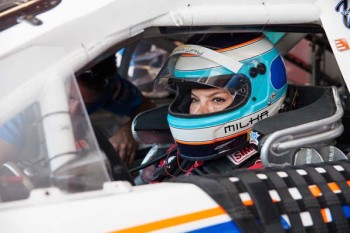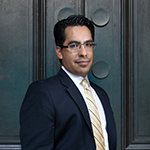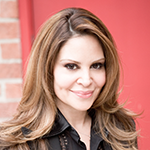Milka Duno prefers the road less traveled. Unlike most people, however, she doesn’t walk the road. She zips around it at more than 200 miles per hour. “I’ve always had a passion for big challenges,” says Duno, one of only a few female race car drivers in the United States. “Everything that is difficult I like to do because that’s when you feel the most satisfaction—when you do something not too many people can do.”
Originally from Caracas, Venezuela, Duno has done lots of things that not too many people can do. In 2004, for instance, she won the Rolex Series Miami Grand Prix, becoming the first woman in history to win a major international race in the United States. Three years later, in 2007, she earned the highest-ever finish—second place—by a female driver in the 51-year history of the 24 Hours of Daytona, a 24-hour endurance race held annually at Daytona International Speedway in Daytona Beach, Florida. That same year she became the first-ever Hispanic woman to compete in the Indianapolis 500, qualifying 29th out of 33 cars at an average speed of 219.23 miles per hour.
Now, with eight professional race wins behind her, Duno is driving toward another major first: in 2013, she transitioned from sports car racing to stock car racing, becoming the first Hispanic woman in the United States to compete in stock car racing on a national level. Now, she wants to be the first Hispanic woman to compete in NASCAR, the pinnacle of stock-car-racing success.
“I am the first and only Hispanic woman to qualify for and compete in the now 101-year history of the Indy 500,” says Duno, who lives in Miami. “I can’t tell you how many Hispanic people all over the world—in Latin America, Mexico, and the United States—were waiting for me to qualify. I didn’t realize it was so important to them, but when I saw them supporting me, I felt extra motivation to qualify. When I did, many people had parties and celebrations. It was a really, really special moment, and I want to [experience it] again in NASCAR.”
Because her racing career has been so remarkable, one might assume that Duno has spent her entire life salivating over broken speed limits. In reality, however, she didn’t discover motorsports until she was 26 years old. She had recently purchased a new car—a Porsche—and a friend invited her to participate in a Porsche Driving Clinic in Venezuela, during which she got her first taste of high-speed driving. She liked it so much that she traveled soon after to the United States to enroll in racing school. A year later she won her first race.
“It’s funny,” Duno says. “Ninety-nine percent of drivers have been dreaming about becoming a race car driver since they were a child. I dreamt of becoming an engineer.”
In fact, Duno was a naval engineer before she was a race car driver—proof that she’s addicted not only to physical challenges, but also mental ones.
“To build ships is one of the most difficult engineering careers because you have to combine electrical, mechanical, and structural calculus with hydrodynamics,” says Duno, who has four master’s degrees—in organizational development, naval architecture, maritime business, and marine biology—three of which she earned simultaneously while studying on a scholarship in Spain, where she worked concurrently as a model. “My background in engineering has been a huge advantage for me in my racing career. It’s how I grew so fast so quickly; in just three years I was driving many different cars, winning many
different races, and breaking many different records.”
Understanding the mechanics of racing helped Duno conquer the track. It’s her determination, however, that has helped her conquer the sport, which requires drivers to be not only athletes, but also entrepreneurs.

“It’s a tough sport because you need many things,” Duno says. Drivers, for instance, need not only a car, but also a team of experts to maintain it, including engineers, mechanics, tire specialists, and engine specialists, all of who must work—like employees in a business—to execute the same strategy in pursuit of the same goal: winning the race. “As a driver, you are the leader in the group. You have to make everybody feel that you can win the race.”
That includes the most important stakeholders of all: the sponsors, who drivers must court and represent like an executive does a very important client. “You need support from companies to help you raise money for sponsorship,” Duno explains. “Because without sponsorship, you can’t race.”
In that way, a driver isn’t just a competitor, but also a brand. And because every win makes the brand stronger and more valuable, Duno goes to great lengths—literally—to succeed.
“You have to race sometimes for two hours in very hot conditions,” remarks Duno, who says drivers must endure intense physical and mental training in order to condition their minds and bodies for the experience of baking inside a metal box for hours at a time, traveling at high speeds while trying to simultaneously maintain control of their vehicle and jockey for position amongst up to 43 other cars. “I run a lot, or bicycle—all in difficult conditions. When I run, for instance, I do it when it’s 100 degrees outside. Everything I do is in extreme situations because it helps you train your mind for when you are in your car.”
Duno gets her mental agility from her father, a salesman, and her mother, a lawyer, who helped support her family with two jobs while she went to law school. “I grew up seeing how hard my parents worked for my brothers and me to have everything we needed,” Duno says. “I followed their example, competing to win in every activity and looking for progress in every aspect of my life.”
The work ethic that she inherited from her parents has helped Duno transgress both gender and racial barriers during her 12-year professional racing career. When she’s not working, therefore, she’s sharing her passion for competition and education via her Milka Way Foundation, which promotes educational achievement to children around the world.
“Education is the most powerful tool you can have in your life,” Duno concludes. “It gives you the opportunity to have a better future, to get the career you want, and to help your family, your community, and the place that you are living. It gives you confidence. It gives you everything.”

